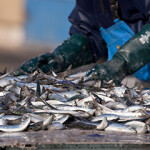Irish bribery investigation likely to be first of many

On 28 March, Irish police raided the offices of a fishing company in County Donegal, in the northwest of the country, on the basis of information that the firm had paid bribes to an African leader for access to fishing rights.
Gardai have disclosed neither the name of the company in question nor the African country, but this type of investigation could be the first of many due to the rising value of continually scarce wild fish stocks, according to figures calling for transparency in fishing access deals.
“I would not be surprised if we see more of those cases appearing globally,” Fisheries Transparency Initiative (FiTI) Head Sven Biermann told SeafoodSource. “What so far has been often underappreciated is just how valuable fish have become.”
The international trade of fisheries and aquaculture products generated around USD 151 billion (EUR 137 billion) in 2020, according to the Food and Agriculture Organization.
Secrecy around fishery access agreements has allowed for corruption to flourish, according to Philip Chou, co-chair of the steering committee guiding the Coalition for Fisheries Transparency, a consortium supporting NGOs globally in efforts to persuade governments to adopt policies promoting transparent fisheries governance.
“Terms of fishing access agreements have traditionally not been disclosed to the public, despite the commodity, fish, being a common public resource,” he said. “Although bribery can still occur when a fishing access agreement is made public, knowing the terms at least provides some basis for civil society to evaluate if the deal is good relative to economic value, sustainability, and equity. Bribes are less likely to occur if the decision-making process was more transparent.”
Chou said he believes the Irish investigation is proof of the need to “publish all collected fisheries data and scientific assessments in order to facilitate access to information for small-scale fishers, fish workers, indigenous communities, industry associations, and civil society in developing fisheries rules, regulations, subsidies and fisheries budgets, and decisions on access to fisheries resources.”
Contacted by SeafoodSource for comment, several Irish fishing representative bodies declined to comment. A member of parliament for the Donegal area who is often vocal on fishery matters, Padraig MacLochlainn, also declined to speak on the issue beyond a one-sentence statement.
“As this matter is currently the subject of a police investigation, it would be inappropriate for me to comment,” he said.
Fisheries comprise a sector that is “highly exposed to corruption,” according to Biermann.
“It is clear that such competitive, lucrative sectors offer conditions where corruption can flourish,” he said. “Other contributing conditions that are present in fisheries include an increasingly regulated sector, a high reliance on third-party agents, complex global value-chains that span multiple authorities, countries and legal jurisdictions, and often weak or inadequate control structures.”
Biermann and FiTI have called for more transparency to curb corruption, by preventing or exposing nefarious acts.
“If the country would have been a FiTI country by then, it would have been easier to spot discrepancies,” he said.
The Garda investigation in Donegal undermines ...
Photo courtesy of Atlantic Dawn




Share